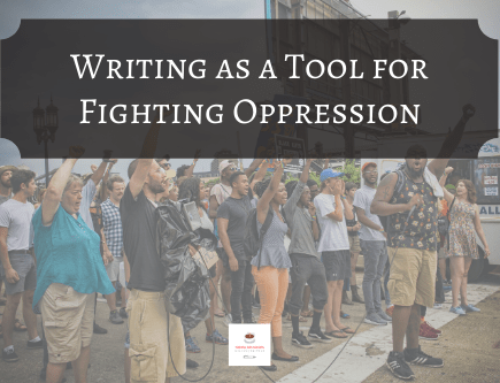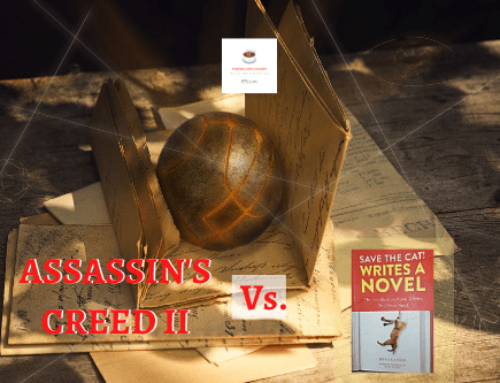Writing fantasy is a great way to not only heal from your past but exaggeratedly explore the issues of society to help initiate greater change. From childhood to adult life, it is a crucial genre in helping us understand the world we live in. It gives readers a new pair of eyes to see the world, whether learning from a place of shelter or exploring issues of society by taking a step back.
In this article, I explore the genre of fantasy as a lens to view society and learn about the world’s issues from the point of view of reading as a child and adult. And, I want to examine how writing fantasy is a tool to explore your own short-comings and heal from them.
Table of Contents
Reading Fantasy in Childhood
Growing up in a sheltered homelife environment made it difficult to explore the world in a meaningful way. My parents wanted to protect and keep me safe from the dangers the world presented. Strangers could kidnap me, using bad words always disgraces the family – I always need to be in eyesight of a trusted adult. I felt trapped in a family dynamic aimed to keep me safe and could not learn life’s lessons for myself.
According to Beth Webb of The Guardian, “Fantasy offers children a rehearsed exploration of the too big, too wide, too dangerous world that is getting closer and more real every day” (Webb 2007). Children are experiencing the world with open eyes, and they need stories that explore topics such as war, bereavement, falling in love, divorce, and more.
Turning to fantasy was my way of exploring the world and the lessons of life. I learned about being brave and facing my fears from The Hobbit, the concepts of friendship and love from Harry Potter, and I learned how to believe in myself from the anime Naruto. In reading and watching fantasy, I was able to dive deeper into learning my place in the world.
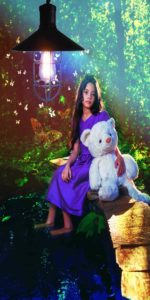
Fantasy is a genre that is often linked with children and childhood. It is seen as a form of escapism to help children escape from their trauma. However, studies show, according to Slate News and Politics, more sheltered children tend to turn to fantasy to learn about the world.
As I did, growing up.
I was not allowed to play outside with my friends when my parents were not home, so I turned to movies, games, and books set in secondary worlds.
Children are designed to learn, according to Alison Gopnik, “children may have such an affinity for the imaginary just because they are so single-mindedly devoted to finding the truth, and because their lives are protected in order to allow them to do so” (Gopnik 2005).
I would place myself into these imaginary worlds, not as an escape from the control of my family, but as a journey or quest to better understand the world in which I am living. This imaginary play helps me and, in turn, children as a whole understand the world and other people more accurately.
Sneaking around Hogwarts with Harry, Herminie, and Ron was a way for me to experience being rebellious from the confines and safety of my home. My parents knew I was safe because I was sitting on a couch or bed – reading.
I learned about the consequences of my action when Harry and the gang would get detention or scolded by their favorite teachers. I felt the anxiety of knowing Mr. Filch could catch me at any time while I snuck through the restricted section of the library. I did not feel a need to rebel in real life, because I lived it in my books.
Children are new to the world. Hence they have imaginations roaring to explore. They want to learn all they can about their bodies, thoughts, possibilities, and how the world operates so they can thrive in it. Fantasy is a place for children to explore these new wonders.
Reading Fantasy as an Adult
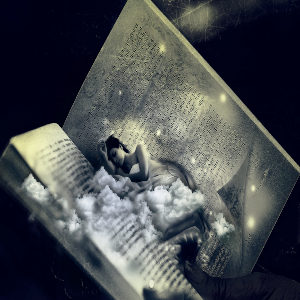
On the other hand, the adult mind puts a constraint on their imagination. We like to think in terms of probability and practicality. How likely is this thought or idea going to help my life? And, how realistic is this thought or idea to my life?
Fantasy relies on a suspension of disbelief because it plays against both probability and practicality. It makes us look at the world with an entirely new set of eyes and challenges our set views.
According to Stephanie Drier, in an article in The Ubyssey, “when people read fantasy, they get a chance to look at their social orders from a different perspective” (Duhatschek 2016). This new perspective allows a reader of fantasy to challenge their preconceived notions of the world.
Adults are drawn to fantasy for a very different reason than a child. Adults turn to fantasy to look at the world from a different perspective. They want to see the world from another pair of eyes, and fantasy allows them to explore the problems in society and ways to improve the issues.
When I read or watch fantasy, I look for the parallels between my reality and the world the author or writer presents. I look for the exaggerations to better understand what is happening in the world. With so much political upheaval arriving in modern society with Black Lives Matter and Covid-19, I turn to fantasy to see what society could do differently.
In Dragon Age, a fantasy video game, elves are an inferior race. Humans see them as less than human and force them into roles of servants and slaves. It exaggerates the issues of discrimination and racism in our society, taking parallels from people of color.
In media, people of color, are often seen in servant roles. A black woman as a waitress to the white leads. Dragon age explores how the elves feel in their position, and how society makes them feel trapped. Just as people of color feel trapped in their roles. Fantasy is the medium used to bring awareness to the issue.
Harry Potter and the Exploration in Race Inequality
“As [Harry] turned to join the rest of the class upon the floor, he saw that they were all looking at him with awe, apparently deeply impressed that he was on speaking terms with Firenze, whom they seemed to find intimidating” (Rowling 2003).

In this scene, the divination’s classroom is getting a new teacher, one that is not expected – a centaur. The obvious connection here, as an adult reader, is the symbolism within a modern classroom. Most students, especially those in higher-income areas, expect their teachers to be a white older male. When they get a teacher that does not conform to this image, they feel a sense of intimidation.
Fantasy, in this scene, allows us to view this diversion of expectations in an overt way. The new teacher is not human, and the class feels a sense of worry and uncomfortableness until Mr. Firenze speaks to Harry. His speaking to Harry shows his human quality and allows the class to put down their guard.
Juxtapose this with my undergrad racism in the media classroom.
It’s the first day, and our teacher is sitting in one of the desks pretending to be a student. Once class begins, and all the students are seated. She stands up and introduces herself to the classroom.
She is a young African American teacher. She asks the class why they didn’t think she was the teacher. The apparent answer no-one immediately wanted to admit was because she was a young black woman.
Harry Potter takes a very real situation and highlights the problem by an act of distancing the reader from the situation. By using make-believe races and creatures, Rowling exaggerates the issues, allowing the reader to separate themselves from the problem and self-reflect.
According to Matthew J. Elder, “this separation, in turn, forces the reader to inhabit and take up a perspective entirely unlike anything they could experience in reality; then upon exiting the fantasy world … [the reader] questions potentially unnoticed assumption in … [their] own social context” (Elder 2015).
While reading the chapter in Rowling’s work, I question how I would react in a similar situation. Would I, too, be afraid of this unfamiliar teacher? Or would I embrace this teacher for the person they are, and give them the benefit of the doubt? With the experience of my undergrad classroom, I have the answer.
Walking into the classroom, I knew immediately she was the teacher. The clipboard and papers were a giveaway to me. Most students, in my experience, don’t take materials out of their backpack immediately on the first day of class. I thought her experiment was memorable and eye-opening. Most of the class acknowledged that she was not how they pictured a teacher.
Now, she was not a centaur. Still, with the racism ingrained in American culture, she might as well have been to the students of that classroom. She intentionally put herself in a position to be viewed as “a other” to make a point. Racism is ingrained in our society. Harry Potter pointed out the same issue in 2003, fourteen years prior to me taking that class.
Writing Fantasy to Learn and Heal from Society
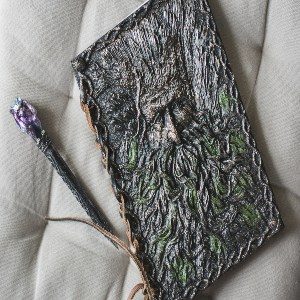
Metaphor is the most powerful tool writers have for exploring reality. By coming up with these grand stories and worlds, we can put a lens on society. Writing fantasy allows one to become hyper-aware of the inner workings of modern society to create a realistic civilization in the world of one’s novel.
Elder states, “Fantasy accomplishes this goal [allowing one to reassess their own socially constructed identities, perspectives, and assumptions] by expressing the familiar in a mode of hyper exaggeration designed to highlight the ways in which the ideals and issues are constructed” (Elder 2015).
Writing allows one to truthfully look at what is happening around themselves and translate it into a story to help their readers see what they see. By writing one’s experience, one can dissociate from the experience and view it with a new perspective. They can change their point of view and find the lessons the experience is teaching.
Writing Fantasy as a Child

In my youth, I was bullied and picked on by my peers. I felt I had no place in the world and was condemned to walk the world alone. When I got home from school, the first thing I would do was power on my computer and write.
I was writing a science fiction fantasy where middle school kids played a video game together. One day, a foreign government hacks the game to sneak their military into American soil to launch an invasion. The kids, being the best players, get sucked into the game to save the world.
Looking back, it was an exploration in what if my hobby meant something. Still, writing the fantasy gave me a purpose. In writing friendships with other students, I was able to better understand the areas in which my current relationships were lacking. I felt less alone while writing my story.
Writing fantasy healed me in ways I did not understand as a child. I wrote because I liked writing, little did I know I was gaining something from it. This exploration of the importance of video games taught me social skills; I did not think I had. It helped me create friends in school by giving me something to talk about. It opened me up from my shy shell, and that experience kept me writing into adulthood.
Writing Fantasy as an Adult
In writing my current work in progress, I explore the modern political climate. The wall around my city of Ul’rog is similar to the one the president is trying to use to separate the U.S. from Mexico. The elvines, in my world, built the wall to protect themselves from invasion by the tamalir, cutting themselves off from the rest of the world – literally vanishing.
I exaggerate the U.S. putting a wall on their border and cutting themselves off from Mexico. The wall is funded by fear, irrational fear that illegal immigration will ruin the U.S. way of life. By writing about this issue and exploring it in my writing, I better understand how fear can drive a nation to act in a way that brings harm to their own image to remain what they think is safe.
The rest of the series deals with tearing down the wall and becoming one in society by making it a safe place for all races and cultures of the world. A place where tamalir, elvines, owls, dwarves, and humans can live together as one.
According to DeSalvo, “…your writing will help you unravel the knots in your heart” (DeSalvo 1999). I suffer from anxiety and depression and have for as long as I can remember. Writing fantasy helps me explore my self-doubt and brutally low self-image.
In writing, Stone of Dragon’s Heart, I get to experience what it is like to be the hero. My character, Helana Glasglo, is the version of myself I want to be. She has my weaknesses and points of view, with the strength to overcome her self-doubt.
She lives in a troubled society, with issues exaggerated from the world I live in. Being elvine, she is marginalized and trying to prevent the genocide of her people, by her oppressors – the tamalir. By leaving the safety of her walled city, she faces the dangers of racism head-on and fights to bring love and unity to all.
Conclusion
Reading and writing fantasy teaches us how the world works at different stages of life. As a youth, it helps one explore the many lessons of life safely and imaginatively. As an adult, it helps you view the issues of society with a fresh perspective, often leading to change. Writing fantasy forces the writer to understand the world in which they are living to make exaggerated truths apparent for the reader.
In writing, the writer gets an opportunity to take a step back from their own pain and mental illnesses and have an opportunity to heal themselves by exploring worlds that are entirely their own.
Bibliography
DeSalvo, Louise. Writing as a Way of Healing: How Telling Our Stories Transforms Our Lives. Boston: Beacon Press, 1999.
Duhatschek, Paula. The Ubyssey: Using fantasy to raise questions about society and social justice. March 09, 2016. https://www.ubyssey.ca/culture/fantasy-of-social-justice-conference-294/ (accessed August 19, 2020).
Elder, Matthew J. Magic as a Tool of Social Construction:Cultural and Gender Identity in Contemporary Fantasy. Waikato: University of Waikato, 2015.
Gopnik, Alison. Slate: The Real Reason Children Love Fantasy. December 05, 2005. https://slate.com/culture/2005/12/children-s-love-of-fantasy.html (accessed August 19, 2020).
Rowling, J. K. Harry Potter and the Order of the Phoenix. New York: Scholastic, 2003.
Webb, Beth. The Guardian: The real purpose of fantasy. April 23, 2007. https://www.theguardian.com/books/booksblog/2007/apr/23/bridgingthegapswhyweneed (accessed August 19, 2020).
C. D. Baron
Latest posts by C. D. Baron (see all)
- What is The Novella? Why You Must Write One to Improve Your Skills! - 03/21/2021
- Wake Up! A Short Story (Work in Progress) - 02/07/2021
- My Top 5 Favorite Reads of All Time (So Far) - 01/24/2021



